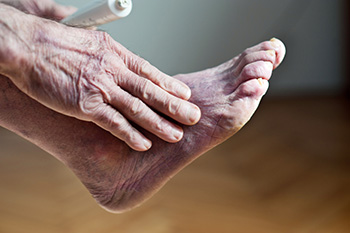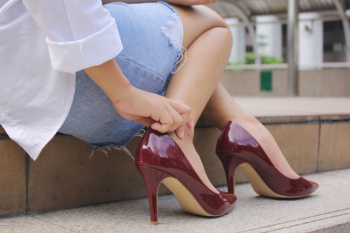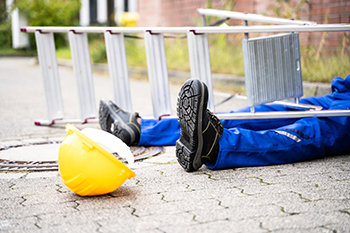
Poor foot circulation, often linked with conditions like peripheral artery disease or diabetes, presents diverse symptoms such as numbness, tingling, weakness, coldness, or cramping in the feet and legs. This condition is more common as one ages. Restricted blood flow deprives tissues of oxygen and nutrients, causing discomfort and potentially severe issues like non-healing wounds or ulcers. The causes typically involve arterial narrowing or blockage due to factors such as smoking, high blood pressure, cholesterol, or diabetes. Lifestyle changes like quitting smoking, managing health conditions, staying active, and a healthy diet can aid in circulation improvement. If you have poor foot circulation and it is persistent or worsening, it is suggested that you seek prompt evaluation by a podiatrist. This type of doctor employs various diagnostic tests to assess circulation and devises personalized treatment strategies that can address underlying conditions and relieve symptoms.
While poor circulation itself isn’t a condition; it is a symptom of another underlying health condition you may have. If you have any concerns with poor circulation in your feet contact Jim Maxka, DPM of South Penn Foot & Ankle Associates. Our doctor will treat your foot and ankle needs.
Poor Circulation in the Feet
Peripheral artery disease (PAD) can potentially lead to poor circulation in the lower extremities. PAD is a condition that causes the blood vessels and arteries to narrow. In a linked condition called atherosclerosis, the arteries stiffen up due to a buildup of plaque in the arteries and blood vessels. These two conditions can cause a decrease in the amount of blood that flows to your extremities, therefore resulting in pain.
Symptoms
Some of the most common symptoms of poor circulation are:
- Numbness
- Tingling
- Throbbing or stinging pain in limbs
- Pain
- Muscle Cramps
Treatment for poor circulation often depends on the underlying condition that causes it. Methods for treatment may include insulin for diabetes, special exercise programs, surgery for varicose veins, or compression socks for swollen legs.
As always, see a podiatrist as he or she will assist in finding a regimen that suits you. A podiatrist can also prescribe you any needed medication.
If you have any questions, please feel free to contact our office located in Hanover, PA . We offer the newest diagnostic and treatment technologies for all your foot care needs.

High heels can have a detrimental effect on your feet, extending beyond mere discomfort. The forward weight shift caused by any heel height can lead to various issues, including hip, back, and knee pain. The pressure exerted on the toes can result in conditions such as bunions and ingrown toenails, while tendinitis may develop over time, especially as one ages. Switching to flats as one ages may not offer relief either. This shift can cause its own set of problems since tendons tighten from high heel wear. Additionally, one can suffer from Morton’s neuroma, and the fat pad beneath the feet tends to thin out with age, leading to metatarsalgia. Moreover, the unstable nature of high heels increases the risk of twisting an ankle. If you wear high heels and either want to continue to do so, or you have sustained foot problems as a result of wearing them, it is suggested that you schedule an appointment with a podiatrist. This type of doctor can offer you treatment options and guide you in choosing alternative shoes that can improve foot health.
High heels have a history of causing foot and ankle problems. If you have any concerns about your feet or ankles, contact Jim Maxka, DPM from South Penn Foot & Ankle Associates. Our doctor can provide the care you need to keep you pain-free and on your feet.
Effects of High Heels on the Feet
High heels are popular shoes among women because of their many styles and societal appeal. Despite this, high heels can still cause many health problems if worn too frequently.
Which Parts of My Body Will Be Affected by High Heels?
- Ankle Joints
- Achilles Tendon – May shorten and stiffen with prolonged wear
- Balls of the Feet
- Knees – Heels cause the knees to bend constantly, creating stress on them
- Back – They decrease the spine’s ability to absorb shock, which may lead to back pain. The vertebrae of the lower back may compress.
What Kinds of Foot Problems Can Develop from Wearing High Heels?
- Corns
- Calluses
- Hammertoe
- Bunions
- Morton’s Neuroma
- Plantar Fasciitis
How Can I Still Wear High Heels and Maintain Foot Health?
If you want to wear high heeled shoes, make sure that you are not wearing them every day, as this will help prevent long term physical problems. Try wearing thicker heels as opposed to stilettos to distribute weight more evenly across the feet. Always make sure you are wearing the proper shoes for the right occasion, such as sneakers for exercising. If you walk to work, try carrying your heels with you and changing into them once you arrive at work. Adding inserts to your heels can help cushion your feet and absorb shock. Full foot inserts or metatarsal pads are available.
If you have any questions please feel free to contact our office located in Hanover, PA . We offer the newest diagnostic and treatment technologies for all your foot and ankle needs.

When facing a fall with foot injuries, adopting specific techniques can minimize the risk of worsening existing conditions or sustaining further harm. Leaning into the fall can help distribute impact and reduce strain on the feet and ankles. Falling to the side instead of forward or backward can protect the toes from direct trauma. Keeping the knees bent upon impact can absorb shock and prevent excessive strain on the lower limbs. In cases of foot injuries resulting from falls, it is suggested you consult a podiatrist for comprehensive evaluation and treatment. Podiatrists possess specialized knowledge in diagnosing and managing foot and ankle injuries. They can assess the extent of damage, and recommend appropriate interventions such as braces, orthotics, or even surgical procedures if necessary.
Preventing falls among the elderly is very important. If you are older and have fallen or fear that you are prone to falling, consult with Jim Maxka, DPM from South Penn Foot & Ankle Associates. Our doctor will assess your condition and provide you with quality advice and care.
Every 11 seconds, an elderly American is being treated in an emergency room for a fall related injury. Falls are the leading cause of head and hip injuries for those 65 and older. Due to decreases in strength, balance, senses, and lack of awareness, elderly persons are very susceptible to falling. Thankfully, there are a number of things older persons can do to prevent falls.
How to Prevent Falls
Some effective methods that older persons can do to prevent falls include:
- Enrolling in strength and balance exercise program to increase balance and strength
- Periodically having your sight and hearing checked
- Discuss any medications you have with a doctor to see if it increases the risk of falling
- Clearing the house of falling hazards and installing devices like grab bars and railings
- Utilizing a walker or cane
- Wearing shoes that provide good support and cushioning
- Talking to family members about falling and increasing awareness
Falling can be a traumatic and embarrassing experience for elderly persons; this can make them less willing to leave the house, and less willing to talk to someone about their fears of falling. Doing such things, however, will increase the likelihood of tripping or losing one’s balance. Knowing the causes of falling and how to prevent them is the best way to mitigate the risk of serious injury.
If you have any questions, please feel free to contact our office located in Hanover, PA . We offer the newest diagnostic and treatment technologies for all your foot care needs.

 Like Us
Like Us Follow Us
Follow Us Review Us
Review Us